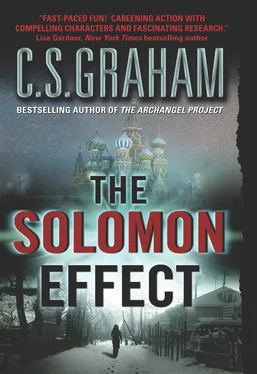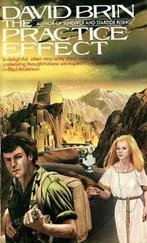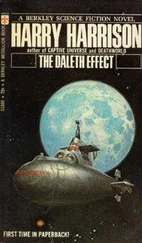They went for a walk along the Weser River, where a wide paved path ran between the embankment and a looming stone wall that protected the red brick buildings above from floods.
“So who is Azzam Badr al’ Din?” October asked, huddling deep in her jacket. A cold wind was blowing in off the North Sea, fluttering her hair around her face and bringing a rosy glow to her cheeks.
“A Druze gunrunner,” said Jax.
She glanced over at him. “A what?”
“A Druze. It’s a kind of offshoot of Islam, with a heavy influence from Gnosticism and neo-Platonism thrown in. Most of the Druze live in Lebanon and Syria, although there are about a hundred thousand of them within the borders of pre-1967 Israel, with maybe another twenty thousand in the Occupied Territories and Jordan. Sometimes they side with other Muslims, but they’ve been known to form alliances with the Maronite Christians and the Israelis, too.”
“So who does Badr al’Din sell his guns to?”
“Basically, anyone who can afford them. As far as Azzam is concerned, if you’ve got a Swiss bank account, then you’re in business. He doesn’t care where your money comes from, just as long as it converts.”
“And how exactly do you and Andrei know this guy?”
“I’m not sure about Andrei. But I first ran into Azzam in the Horn of Africa. He was selling guns to my people, and to Andrei’s people, and cheating both of us.”
She walked along in silence for a moment, her hands thrust into her pockets. “You think he’s the one who hit the Yalena and set the U-boat to explode?”
Jax shook his head. “Azzam Badr al’Din is a liar and a cheat, but I’ve never known him to have blood directly on his hands. Don’t get me wrong-I’m sure he’s caused the deaths of tens of thousands of people, indirectly. But what we saw on the Yalena…That isn’t his style.”
“So what is his part in all this?”
“I don’t know.” Jax reached for his phone. “But I intend to find out.”
She watched him. “You know Badr al’Din’s phone number, too?”
Jax paused at the edge of the stone embankment leading down to the river. “No. I’m calling Matt. It’s not going to be easy, setting up a meeting with this guy.”
She tilted back her head, her breath showing white in the cold as she stared up at the pointed spires of the cathedral, thrusting tall above the roofs of the ancient buildings lining the quay. “Let me guess; we’re going to Lebanon.”
He grinned. “If I remember correctly, you wanted to go to Lebanon when we left Russia.”
She sighed. “At least I get to sleep in a bed tonight.”
Jax glanced at his watch. “If you hurry.”
Matt called back about an hour later.
“I got a fix on your Azzam Badr al’Din,” said Matt. “He’s in the Chouf region of Lebanon. You’re booked on the six A.M. Lufthansa flight from Bremen to Beirut.”
Jax glanced over at Tobie, who had fallen asleep, still dressed, on top of the covers. “How do I contact him?”
“We’re working on that. We should have something by the time you land in Beirut.”
“How many people know we’re going to Lebanon?”
“The usual channels. But don’t worry. I told the station people at the embassy there to give you a wide berth.”
“I was thinking more about the file photo my friend in Berlin was carrying.”
“Ah.” Matt blew out his breath in a long sigh. “We’re still trying to get a fix on that. Whoever’s accessing your file is good, Jax. We can’t trace them.”
“What is it you’re saying? That they’ve done it again?”
“About half an hour ago. Your file, and October’s, too.”
Beirut, Lebanon: Thursday 29 October 1:15 P.M. local time
By one o’clock that afternoon, Jax and Tobie were in Beirut, standing in front of a seedy falafel stand known as Chez Mahmoud. A fierce Mediterranean sun flooded the narrow street with golden waves of dusty heat as a steady stream of sleek Mercedes, honking Fiats, and diesel-belching trucks thundered past.
“He’s late,” said Tobie, glancing at her watch. They had been told to wait here, in South Beirut. Azzam Badr al’Din would contact them.
Jax gave a soft laugh. “Of course he’s late. This is Beirut, not Berlin.”
Tobie’s gaze drifted to the bullet-pocked walls of the buildings around them. Once, Beirut had been called the Paris of the Middle East, back in the days when Lebanon had been held up as a shining example of how people of different religions could coexist peacefully for centuries. Then came the creation of Israel in 1948, and hundreds of thousands of Christian and Sunni Muslim Palestinians poured across the border to escape the fighting. The delicate balance teetered. Collapsed. By the 1970s, Lebanon had descended into a brutal civil war that killed tens of thousands; repeated Israeli invasions and bombing raids killed tens of thousands more. Now, in the wealthier areas along the Corniche, rebuilding efforts were once again underway. But here, in the poorer sections, debris and bomb-shattered buildings were everywhere.
“What is it?” she asked, as she watched Jax’s eyes narrow.
“The tan Range Rover. See it?”
She saw it. Swooping in close to the curb, the driver hit the brakes. The SUV skidded to a halt; two men toting Skorpion machine pistols spilled out of the car.
“Shit,” she whispered, taking an involuntary step back.
One of the men was big and brawny, maybe mid-thirties, his complexion olive, his hair dark and wavy. His companion was both younger and fairer, no more than a boy, with green eyes and a wide smile. He held the muzzle of his machine pistol against Jax’s cheek and said in rapid Arabic, “Get in the car, please.”
They got in the car. The brawny, olive-skinned guy took the seat next to the driver, while his younger companion squeezed into the back with Jax and Tobie.
Jax, she had discovered, spoke fluent Arabic. He said, “No blindfold?”
The boy beside them laughed. “You’ve been watching too many Hollywood movies. Everyone in Beirut knows where Dr. Badr al’Din lives.”
Tobie whispered to Jax, “Doctor?”
“He has a Ph.D. in psychology. From Berkeley.”
“You didn’t tell me that.”
They took off in a swirl of dust. It occurred to her, looking back, that no one on that crowded street seemed at all shocked or disturbed by what had just happened. The guy in the falafel stand hadn’t even looked up.
They headed south, past the sports stadium, past a squalid ghetto of tiny shacks built of concrete blocks hideously crowded together. As she stared at the grim, crooked alleyways lined with wretched half built, half destroyed houses crisscrossed by sagging lines of tattered wash that drooped in the dusty heat, she realized what she was looking at. A refugee camp.
“That’s Sabra and Shatila,” said the boy, following her gaze.
For some reason she couldn’t explain, she felt a brush of cold air against her cheek, like the whisper of an unseen, unhappy ghost that was there, then gone.
She was glad when they broke free of the city, passing through olive groves and scattered villages of whitewashed houses with flat roofs and shutters rolled down against the heat of the day. The sea was a swath of vivid sparkling blue on their right. Then the road they followed swung toward the mountains, and thick stands of sweet-smelling cedars rose up beside them until the sea only appeared in surprising glimpses when they rounded a bend or crested a ridge. The driver punched a CD into the stereo, and the wail of a popular Lebanese singer filled the car.
Gradually, the road narrowed, deteriorated. Chickens scratched at the rocky soil beneath scented orange groves; goats lifted their heads to watch as the dusty Range Rover roared past. They were stopped at one checkpoint, then another. Looking ahead, Tobie saw a fortresslike compound rising above them.
Читать дальше











